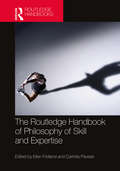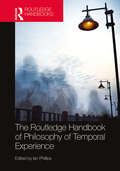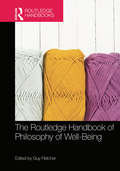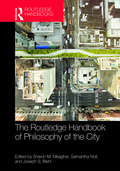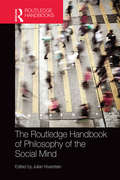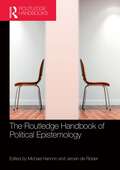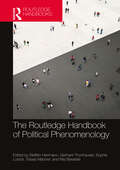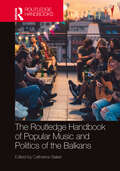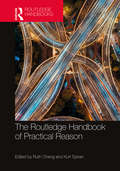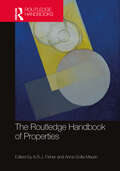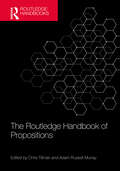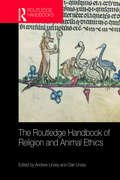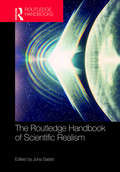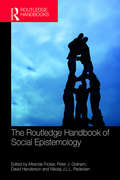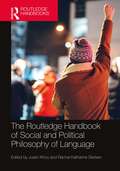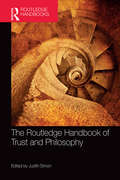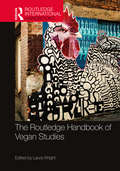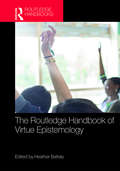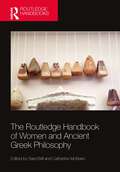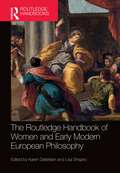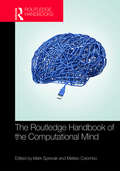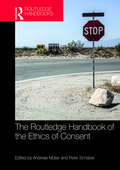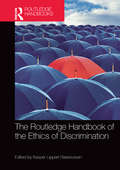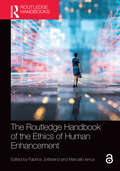- Table View
- List View
The Routledge Handbook of Philosophy of Skill and Expertise (Routledge Handbooks in Philosophy)
by Ellen FridlandPhilosophical questions surrounding skill and expertise can be traced back as far as Ancient Greece, China, and India. In the twentieth century, skilled action was an important factor in the work of phenomenologists such as Heidegger and Merleau-Ponty and analytic philosophers including Gilbert Ryle. However, as a subject in its own right it has, until now, remained largely in the background.The Routledge Handbook of Philosophy of Skill and Expertise is an outstanding reference source and the first major collection of its kind, reflecting the explosion of interest in the topic in recent years. Comprising thirty-nine chapters written by leading international contributors, the Handbook is organized into six clear parts:• Skill in the history of philosophy (East and West) • Skill in epistemology• Skill, intelligence, and agency• Skill in perception, imagination, and emotion• Skill, language, and social cognition• Skill and expertise in normative philosophy. Essential reading for students and researchers in philosophy of mind and psychology, epistemology, and ethics, The Routledge Handbook of Philosophy of Skill and Expertise is also suitable for those in related disciplines such as social psychology and cognitive science. It is also relevant to those who are interested in conceptual issues underlying skill and expertise in fields such as sport, the performing arts, and medicine.
The Routledge Handbook of Philosophy of Temporal Experience (Routledge Handbooks in Philosophy)
by Ian PhillipsExperience is inescapably temporal. But how do we experience time? Temporal experience is a fundamental subject in philosophy – according to Husserl, the most important and difficult of all. Its puzzles and paradoxes were of critical interest from the Early Moderns through to the Post-Kantians. After a period of relative neglect, temporal experience is again at the forefront of debates across a wealth of areas, from philosophy of mind and psychology, to metaphysics and aesthetics. The Routledge Handbook of Philosophy of Temporal Experience is an outstanding reference source to the key debates in this exciting subject area and represents the first collection of its kind. Comprising nearly 30 chapters by a team of international contributors, the Handbook is organized into seven clear parts: Ancient and early modern perspectives Nineteenth and early twentieth-century perspectives The structure of temporal experience Temporal experience and the philosophy of mind Temporal experience and metaphysics Empirical perspectives Aesthetics Within each part, key topics concerning temporal experience are examined, including canonical figures such as Locke, Kant and Husserl; extensionalism, retentionalism and the specious present; interrelations between temporal experience and time, agency, dreaming, and the self; empirical theories of perceiving and attending to time; and temporal awareness in the arts including dance, music and film. The Routledge Handbook of Philosophy of Temporal Experience is essential reading for students and researchers of philosophy of mind and psychology. It is also extremely useful for those in related fields such as metaphysics, phenomenology and aesthetics, as well as for psychologists and cognitive neuroscientists.
The Routledge Handbook of Philosophy of Well-Being (Routledge Handbooks in Philosophy)
by Guy FletcherThe concept of well-being is one of the oldest and most important topics in philosophy and ethics, going back to ancient Greek philosophy. Following the boom in happiness studies in the last few years it has moved to centre stage, grabbing media headlines and the attention of scientists, psychologists and economists. Yet little is actually known about well-being and it is an idea that is often poorly articulated. The Routledge Handbook of Philosophy of Well-Being provides a comprehensive, outstanding guide and reference source to the key topics and debates in this exciting subject. Comprising over 40 chapters by a team of international contributors, the Handbook is divided into six parts: well-being in the history of philosophy current theories of well-being, including hedonism and perfectionism examples of well-being and its opposites, including friendship and virtue and pain and death theoretical issues, such as well-being and value, harm, identity and well-being and children well-being in moral and political philosophy well-being and related subjects, including law, economics and medicine. Essential reading for students and researchers in ethics and political philosophy, it is also an invaluable resource for those in related disciplines such as psychology, politics and sociology.
The Routledge Handbook of Philosophy of the City (Routledge Handbooks in Philosophy)
by Sharon MeagherThe Routledge Handbook of Philosophy of the City is an outstanding reference source to this exciting subject and the first collection of its kind. Comprising 40 chapters by a team of international contributors, the Handbook is divided into clear sections addressing the following central topics: • Historical Philosophical Engagements with Cities • Modern and Contemporary Philosophical Theories of the City • Urban Aesthetics • Urban Politics • Citizenship • Urban Environments and the Creation/Destruction of Place. The concluding section, Urban Engagements, contains interviews with philosophers discussing their engagement with students and the wider public on issues and initiatives including experiential learning, civic and community engagement, disability rights and access, environmental degradation, professional diversity, social justice, and globalization. Essential reading for students and researchers in environmental philosophy, aesthetics, and political philosophy, The Routledge Handbook of Philosophy of the City is also a useful resource for those in related fields, such as geography, urban studies, sociology, and political science.
The Routledge Handbook of Philosophy of the Social Mind (Routledge Handbooks in Philosophy)
by Julian KiversteinThe idea that humans are by nature social and political animals can be traced back to Aristotle. More recently, it has also generated great interest and controversy in related disciplines such as anthropology, biology, psychology, neuroscience and even economics. What is it about humans that enabled them to construct a social reality of unrivalled complexity? Is there something distinctive about the human mind that explains how social lives are organised around conventions, norms, and institutions? The Routledge Handbook of Philosophy of the Social Mind is an outstanding reference source to the key topics and debates in this exciting subject and is the first collection of its kind. An international team of contributors present perspectives from diverse areas of research in philosophy, drawing on comparative and developmental psychology, evolutionary anthropology, cognitive neuroscience, and behavioural economics. The thirty-two original chapters are divided into five parts: The evolution of the social mind: including the social intelligence hypothesis, co- evolution of culture and cognition, ethnic cognition, and cooperation; Developmental and comparative perspectives: including primate and infant understanding of mind, shared intentionality, and moral cognition; Mechanisms of the moral mind: including norm compliance, social emotion, and implicit attitudes; Naturalistic approaches to shared and collective intentionality: including joint action, team reasoning and group thinking, and social kinds; Social forms of selfhood and mindedness: including moral identity, empathy and shared emotion, normativity and intentionality. Essential reading for students and researchers in philosophy of mind and psychology, The Routledge Handbook of Philosophy of the Social Mind is also suitable for those in related disciplines such as social psychology, cognitive neuroscience, economics and sociology.
The Routledge Handbook of Political Epistemology (Routledge Handbooks in Philosophy)
by Jeroen De Ridder Michael HannonAs political discourse had been saturated with the ideas of "post-truth", "fake news", "epistemic bubbles", and "truth decay", it was no surprise that in 2017 The New Scientist declared: "Philosophers of knowledge, your time has come." Political epistemology has old roots, but is now one of the most rapidly growing and important areas of philosophy. The Routledge Handbook of Political Epistemology is an outstanding reference source to this exciting field, and the first collection of its kind. Comprising 41 chapters by an international team of contributors, it is divided into seven parts: Politics and truth: historical and contemporary perspectives Political disagreement and polarization Fake news, propaganda, and misinformation Ignorance and irrationality in politics Epistemic virtues and vices in politics Democracy and epistemology Trust, expertise, and doubt. Within these sections crucial issues and debates are examined, including: post-truth, disagreement and relativism, epistemic networks, fake news, echo chambers, propaganda, ignorance, irrationality, political polarization, virtues and vices in public debate, epistocracy, expertise, misinformation, trust, and digital democracy, as well as the views of Plato, Aristotle, Mòzǐ, medieval Islamic philosophers, Mill, Arendt, and Rawls on truth and politics. The Routledge Handbook of Political Epistemology is essential reading for those studying political philosophy, applied and social epistemology, and politics. It is also a valuable resource for those in related disciplines such as international relations, law, political psychology, political science, communication studies, and journalism.
The Routledge Handbook of Political Epistemology (Routledge Handbooks in Philosophy)
by Jeroen De Ridder Michael HannonAs political discourse had been saturated with the ideas of "post-truth", "fake news", "epistemic bubbles", and "truth decay", it was no surprise that in 2017 The New Scientist declared: "Philosophers of knowledge, your time has come." Political epistemology has old roots, but is now one of the most rapidly growing and important areas of philosophy.The Routledge Handbook of Political Epistemology is an outstanding reference source to this exciting field, and the first collection of its kind. Comprising 41 chapters by an international team of contributors, it is divided into seven parts: Politics and truth: historical and contemporary perspectives Political disagreement and polarization Fake news, propaganda, and misinformation Ignorance and irrationality in politics Epistemic virtues and vices in politics Democracy and epistemology Trust, expertise, and doubt. Within these sections crucial issues and debates are examined, including: post-truth, disagreement and relativism, epistemic networks, fake news, echo chambers, propaganda, ignorance, irrationality, political polarization, virtues and vices in public debate, epistocracy, expertise, misinformation, trust, and digital democracy, as well as the views of Plato, Aristotle, Mòzǐ, medieval Islamic philosophers, Mill, Arendt, and Rawls on truth and politics.The Routledge Handbook of Political Epistemology is essential reading for those studying political philosophy, applied and social epistemology, and politics. It is also a valuable resource for those in related disciplines such as international relations, law, political psychology, political science, communication studies, and journalism.
The Routledge Handbook of Political Phenomenology (Routledge Handbooks in Philosophy)
by Gerhard Thonhauser Sophie Loidolt Tobias Matzner Steffen Herrmann Nils BaratellaPhenomenology has primarily been concerned with conceptual questions about knowledge and ontology. However, in recent years, the rise of interest and research in applied phenomenology has seen the study of political phenomenology move to a central place in the study of phenomenology generally.The Routledge Handbook of Political Phenomenology is the first major collection on this important topic. Comprising 35 chapters by an international team of expert contributors, the handbook is organized into six clear parts, each with its own introduction by the editors: Founders of Phenomenology Existentialist Phenomenology Phenomenology of the Social and Political World Phenomenology of Alterity Phenomenology in Debate Contemporary Developments. Full attention is given to central figures in the phenomenological movement, including Husserl, Heidegger, Sartre, Merleau-Ponty, and Levinas, as well as those whose contribution to political phenomenology is more distinctive, such as Arendt, De Beauvoir, and Fanon. Also included are chapters on gender, race and intersectionality, disability, and technology.Ideal for those studying phenomenology, continental philosophy, and political theory, The Routledge Handbook of Political Phenomenology bridges an important gap between a major philosophical movement and contemporary political issues and concepts.
The Routledge Handbook of Popular Music and Politics of the Balkans (Routledge Music Handbooks)
by Catherine BakerThe Routledge Handbook of Popular Music and Politics of the Balkans is a comprehensive overview of major topics, established debates and new directions in the study of popular music and politics in this region.The vibrant growth of this subject area since the 1990s has been intertwined with the region’s political and socio-economic transformations, including the collapse of state socialism in much of the region, the break-up of Yugoslavia, the advent of neoliberal capitalism, the rise of Romani activism, the complex politics of ‘Europeanization’ before and after the global financial crisis, and the region’s relationship to the European Union border regime. The handbook illustrates the wide range of disciplines and methods that contribute to this field’s interdisciplinary dialogue and highlights emerging approaches such as the study of Black diasporas in the region, popular music’s links with LGBTQ+ communities, and the impact of digital technologies on musical cultures.This volume will benefit specialist researchers, tutors creating or refreshing courses on popular music in the region, and students interested in these topics, especially those who are at the point of developing their own independent research projects.
The Routledge Handbook of Practical Reason (Routledge Handbooks in Philosophy)
by Ruth Chang Kurt SylvanOver the last several decades, questions about practical reason have come to occupy the center stage in ethics and metaethics. The Routledge Handbook of Practical Reason is an outstanding reference source to this exciting and distinctive subject area and is the first volume of its kind. Comprising thirty-six chapters by an international team of contributors, the Handbook provides a comprehensive overview of the field and is divided into five parts: Foundational Matters Practical Reason in the History of Philosophy Philosophy of Practical Reason as Action Theory and Moral Psychology Philosophy of Practical Reason as Theory of Practical Normativity The Philosophy of Practical Reason as the Theory of Practical Rationality The Handbook also includes two chapters by the late Derek Parfit, ‘Objectivism about Reasons’ and ‘Normative Non-Naturalism.’ The Routledge Handbook of Practical Reason is essential reading for philosophy students and researchers in metaethics, philosophy of action, action theory, ethics, and the history of philosophy.
The Routledge Handbook of Properties (Routledge Handbooks in Philosophy)
by Anna-Sofia Maurin Fisher, A.R.J.Philosophical questions regarding both the existence and nature of properties are ubiquitous in ordinary life, the sciences, and philosophical theorising. In philosophy, it is one of the oldest topics discussed in various intellectual traditions – East and West – reaching back to Plato and Aristotle. Today, in the analytic tradition, properties continue to be a core area of study and research. The Routledge Handbook of Properties is an outstanding reference source to this perennial topic and is the first major volume of its kind. It contains forty specially commissioned chapters written by an international team of expert contributors, and is divided into nine clear parts: Methodology and Metaontology Distinctions Realism about Universals Nominalism Trope Theory Properties in Causation, Time, and Modality Properties in Science Properties in Language and Mind Properties in the Normative Realm, the Social World, and Aesthetics The Routledge Handbook of Properties is essential reading for anyone studying and researching metaphysics, metametaphysics, and ontology, and will also be of interest to those in closely related areas such as philosophy of science, philosophy of language, philosophy of mind, ethics, and aesthetics.
The Routledge Handbook of Propositions (Routledge Handbooks in Philosophy)
by Adam Russell Murray Chris TillmanPropositions are routinely invoked by philosophers, linguists, logicians, and other theorists engaged in the study of meaning, communication, and the mind. To investigate the nature of propositions is to investigate the very nature of our connection to each other, and to the world around us. As one of the only volumes of its kind, The Routledge Handbook of Propositions provides a comprehensive overview of the philosophy of propositions, from both historical and contemporary perspectives. Comprising 33 original chapters by an international team of scholars, the volume addresses both traditional and emerging questions concerning the nature of propositions, and our capacity to engage with them in thought and in communication. The chapters are clearly organized into the following three sections: I. Foundational Issues in the Theory of Propositions II. Historical Theories of Propositions III. Contemporary Theories of Propositions Essential reading for philosophers of language and mind, and for those working in neighboring areas, The Routledge Handbook of Propositions is suitable for upper-level undergraduate study, as well as graduate and professional research.
The Routledge Handbook of Religion and Animal Ethics (Routledge Handbooks in Religion)
by Andrew Linzey Clair LinzeyThe ethical treatment of non-human animals is an increasingly significant issue, directly affecting how people share the planet with other creatures and visualize themselves within the natural world. The Routledge Handbook of Religion and Animal Ethics is a key reference source in this area, looking specifically at the role religion plays in the formation of ethics around these concerns. Featuring thirty-five chapters by a team of international contributors, the handbook is divided into two parts. The first gives an overview of fifteen of the major world religions’ attitudes towards animal ethics and protection. The second features five sections addressing the following topics: Human Interaction with Animals Killing and Exploitation Religious and Secular Law Evil and Theodicy Souls and Afterlife This handbook demonstrates that religious traditions, despite often being anthropocentric, do have much to offer to those seeking a framework for a more enlightened relationship between humans and non-human animals. As such, The Routledge Handbook of Religion and Animal Ethics is essential reading for students and researchers in religious studies, theology, and animal ethics as well as those studying the philosophy of religion and ethics more generally.
The Routledge Handbook of Scientific Realism (Routledge Handbooks in Philosophy)
by Juha SaatsiScientific realism is a central, long-standing, and hotly debated topic in philosophy of science. Debates about scientific realism concern the very nature and extent of scientific knowledge and progress. Scientific realists defend a positive epistemic attitude towards our best theories and models regarding how they represent the world that is unobservable to our naked senses. Various realist theses are under sceptical fire from scientific antirealists, e.g. empiricists and instrumentalists. The different dimensions of the ensuing debate centrally connect to numerous other topics in philosophy of science and beyond. The Routledge Handbook of Scientific Realism is an outstanding reference source – the first collection of its kind – to the key issues, positions, and arguments in this important topic. Its thirty-four chapters, written by a team of international experts, are divided into five parts: Historical development of the realist stance Classic debate: core issues and positions Perspectives on contemporary debates The realism debate in disciplinary context Broader reflections In these sections, the core issues and debates presented, analysed, and set into broader historical and disciplinary contexts. The central issues covered include motivations and arguments for realism; challenges to realism from underdetermination and history of science; different variants of realism; the connection of realism to relativism and perspectivism; and the relationship between realism, metaphysics, and epistemology. The Routledge Handbook of Scientific Realism is essential reading for students and researchers in philosophy of science. It will also be very useful for anyone interested in the nature and extent of scientific knowledge.
The Routledge Handbook of Social Epistemology (Routledge Handbooks in Philosophy)
by David Henderson Miranda Fricker Jeremy Wyatt Peter J. Graham Nikolaj PedersenEdited by an international team of leading scholars, The Routledge Handbook of Social Epistemology is the first major reference work devoted to this growing field. The Handbook’s 46 chapters, all appearing in print here for the first time, and written by philosophers and social theorists from around the world, are organized into eight main parts: Historical Backgrounds The Epistemology of Testimony Disagreement, Diversity, and Relativism Science and Social Epistemology The Epistemology of Groups Feminist Epistemology The Epistemology of Democracy Further Horizons for Social Epistemology With lists of references after each chapter and a comprehensive index, this volume will prove to be the definitive guide to the burgeoning interdisciplinary field of social epistemology.
The Routledge Handbook of Social and Political Philosophy of Language (Routledge Handbooks in Philosophy)
by Justin Khoo Rachel SterkenThis Handbook brings together philosophical work on how language shapes, and is shaped by, social and political factors. Its 24 chapters were written exclusively for this volume by an international team of leading researchers, and together they provide a broad expert introduction to the major issues currently under discussion in this area. The volume is divided into four parts: Part I: Methodological and Foundational IssuesPart II: Non-ideal Semantics and PragmaticsPart III: Linguistic HarmsPart IV: Applications The parts, and chapters in each part, are introduced in the volume’s General Introduction. A list of Works Cited concludes each chapter, pointing readers to further areas of study. The Handbook is the first major, multi-authored reference work in this growing area and essential reading for anyone interested in the nature of language and its relationship to social and political reality.
The Routledge Handbook of Trust and Philosophy (Routledge Handbooks in Philosophy)
by Judith SimonTrust is pervasive in our lives. Both our simplest actions – like buying a coffee, or crossing the street – as well as the functions of large collective institutions – like those of corporations and nation states – would not be possible without it. Yet only in the last several decades has trust started to receive focused attention from philosophers as a specific topic of investigation. The Routledge Handbook of Trust and Philosophy brings together 31 never-before published chapters, accessible for both students and researchers, created to cover the most salient topics in the various theories of trust. The Handbook is broken up into three sections: I. What is Trust? II. Whom to Trust? III. Trust in Knowledge, Science, and Technology The Handbook is preceded by a foreword by Maria Baghramian, an introduction by volume editor Judith Simon, and each chapter includes a bibliography and cross-references to other entries in the volume.
The Routledge Handbook of Vegan Studies (Routledge International Handbooks)
by Laura WrightThis wide-ranging volume explores the tension between the dietary practice of veganism and the manifestation, construction, and representation of a vegan identity in today’s society. Emerging in the early 21st century, vegan studies is distinct from more familiar conceptions of "animal studies," an umbrella term for a three-pronged field that gained prominence in the late 1990s and early 2000s, consisting of critical animal studies, human animal studies, and posthumanism. While veganism is a consideration of these modes of inquiry, it is a decidedly different entity, an ethical delineator that for many scholars marks a complicated boundary between theoretical pursuit and lived experience. The Routledge Handbook of Vegan Studies is the must-have reference for the important topics, problems, and key debates in the subject area and is the first of its kind. Comprising over 30 chapters by a team of international contributors, this handbook is divided into five parts: History of vegan studies Vegan studies in the disciplines Theoretical intersections Contemporary media entanglements Veganism around the world These sections contextualize veganism beyond its status as a dietary choice, situating veganism within broader social, ethical, legal, theoretical, and artistic discourses. This book will be essential reading for students and researchers of vegan studies, animal studies, and environmental ethics.
The Routledge Handbook of Virtue Epistemology (Routledge Handbooks in Philosophy)
by Heather BattalyWhat is an epistemic virtue? Are epistemic virtues reliable? Are they motivated by a love of truth? Do epistemic virtues produce knowledge and understanding? How can we develop epistemic virtues? The Routledge Handbook of Virtue Epistemology answers all of these questions. This landmark volume provides a pluralistic and comprehensive picture of the field of virtue epistemology. It is the first large-scale volume of its kind on the topic. Composed of 41 chapters, all published here for the first time, it breaks new ground in four areas. It articulates the structure and features of epistemic virtues. It provides in-depth analyses of 10 individual epistemic virtues. It examines the connections between epistemic virtue, knowledge, and understanding. It applies virtue epistemology, and explores its impact on related fields. The contributing authors are pioneers in the study of epistemic virtue. This volume is an outstanding resource for students and scholars in philosophy, as well as researchers in intersecting fields, including education, psychology, political science, and women’s studies.
The Routledge Handbook of Women and Ancient Greek Philosophy (Routledge Handbooks in Philosophy)
by Sara Brill Catherine McKeenThe Routledge Handbook of Women and Ancient Greek Philosophy is an essential reference source for cutting-edge scholarship on women, gender, and philosophy in Greek antiquity. The volume features original research that crosses disciplines, offering readers an accessible guide to new methods, new sources, and new questions in the study of ancient Greek philosophy and its multiple afterlives. Comprising 40 chapters from a diverse international group of experts, the Handbook considers questions about women and gender in sources from Greek antiquity spanning the period from 7th c. BCE to 2nd c. BCE, and in receptions of Greek antiquity from the Roman Imperial period, through the European Renaissance to the current day. Chapters are organized into five major sections: I. Early Greek antiquity – including Sappho, Presocratic philosophy, Sophists, and Greek tragedy – 700s–400s BCEII. Classical Greek antiquity – including Aeschines, Plato, and Xenophon – 400s–300s BCEIII. Late Classical Greek to Hellenistic antiquity – including Cyrenaics, Cynics, the Hippocratic corpus, and Aristotle – 300s–200s BCEIV. Late Greek antiquity to Roman Imperial period – including Pythagorean women, Stoics, Pyrrhonian Skeptics, and late Platonists – 200s BCE to 700s CEV. Later receptions – including Shakespeare, the European Renaissance, Anna Julia Cooper, W.E.B. DuBois, Jane Harrison, Sarah Kofman, and Toni MorrisonThe Routledge Handbook of Women and Ancient Greek Philosophy is a vital resource for students and scholars in philosophy, Classics, and gender studies who want to gain a deeper understanding of philosophy’s rich past and explore sources and questions beyond the traditional canon. The volume is a valuable resource, as well, for students and scholars from history, humanities, literature, political science, religious studies, rhetorical studies, theatre, and LGBTQ and sexuality studies.
The Routledge Handbook of Women and Early Modern European Philosophy (Routledge Handbooks in Philosophy)
by Karen Detlefsen Lisa ShapiroThe Routledge Handbook of Women and Early Modern European Philosophy is an outstanding reference source for the wide range of philosophical contributions made by women writing in Europe from about 1560 to 1780. It shows the range of genres and methods used by women writing in these centuries in Europe, thus encouraging an expanded understanding of our historical canon. Comprising 46 chapters by a team of contributors from all over the globe, including early career researchers, the Handbook is divided into the following sections: I. Context II. Themes A. Metaphysics and Epistemology B. Natural Philosophy C. Moral Philosophy D. Social-Political PhilosophyIII. FiguresIV. State of the Field The volume is essential reading for students and researchers in philosophy who are interested in expanding their understanding of the richness of our philosophical past, including in order to offer expanded, more inclusive syllabi for their students. It is also a valuable resource for those in related fields like gender and women’s studies; history; literature; sociology; history and philosophy of science; and political science.
The Routledge Handbook of the Computational Mind (Routledge Handbooks in Philosophy)
by Mark Sprevak Matteo ColomboComputational approaches dominate contemporary cognitive science, promising a unified, scientific explanation of how the mind works. However, computational approaches raise major philosophical and scientific questions. In what sense is the mind computational? How do computational approaches explain perception, learning, and decision making? What kinds of challenges should computational approaches overcome to advance our understanding of mind, brain, and behaviour? The Routledge Handbook of the Computational Mind is an outstanding overview and exploration of these issues and the first philosophical collection of its kind. Comprising thirty-five chapters by an international team of contributors from different disciplines, the Handbook is organised into four parts: History and future prospects of computational approaches Types of computational approach Foundations and challenges of computational approaches Applications to specific parts of psychology. Essential reading for students and researchers in philosophy of mind, philosophy of psychology, and philosophy of science, The Routledge Handbook of the Computational Mind will also be of interest to those studying computational models in related subjects such as psychology, neuroscience, and computer science.
The Routledge Handbook of the Ethics of Consent (Routledge Handbooks in Applied Ethics)
by Andreas Müller Peter SchaberWhile the importance of consent has been discussed widely over the last few decades, interest in its study has received renewed attention in recent years, particularly regarding medical treatment, clinical research and sexual acts. The Routledge Handbook of the Ethics of Consent is an outstanding reference source to this exciting subject and the first collection of its kind. Comprising over thirty chapters by a team of international contributors, the Handbook is divided into five main parts: • General questions • Normative ethics • Legal theory • Medical ethics • Political philosophy. Within these sections central issues, debates and problems are examined, including: the nature and normative importance of consent, paternalism, exploitation and coercion, privacy, sexual consent, consent and criminal law, informed consent, organ donation, clinical research, and consent theory of political obligation and authority. The Routledge Handbook of the Ethics of Consent is essential reading for students and researchers in moral theory, applied ethics, medical ethics, philosophy of law and political philosophy. This volume will also be very useful for those in related fields, such as political science, law, medicine and social science.
The Routledge Handbook of the Ethics of Discrimination (Routledge Handbooks in Applied Ethics)
by Kasper Lippert-RasmussenWhile it has many connections to other topics in normative and applied ethics, discrimination is a central subject in philosophy in its own right. It plays a significant role in relation to many real-life complaints about unjust treatment or unjust inequalities, and it raises a number of questions in political and moral philosophy, and in legal theory. Some of these questions include: what distinguishes the concept of discrimination from the concept of differential treatment? What distinguishes direct from indirect discrimination? Is discrimination always morally wrong? What makes discrimination wrong? How should we eliminate the effects of discrimination? By covering a wide range of topics, and by doing so in a way that does not assume prior acquaintance, this handbook enables the reader to get to grips with the omnipresent issue. The Routledge Handbook of the Ethics of Discrimination is an outstanding reference source to this exciting subject and the first collection of its kind. Comprising over thirty chapters by a team of international contributors the handbook is divided into six main parts: • conceptual issues • the wrongness of discrimination • groups of ‘discriminatees’ • sites of discrimination • causes and means • history of discrimination. Essential reading for students and researchers in applied ethics and political philosophy the handbook will also be very useful for those in related fields, such as law, sociology and politics.
The Routledge Handbook of the Ethics of Human Enhancement (Routledge Handbooks in Applied Ethics)
by Fabrice Jotterand and Marcello IencaThe Routledge Handbook of the Ethics of Human Enhancement provides readers with a philosophically rich and scientifically grounded analysis of human enhancement and its ethical implications. A landmark in the academic literature, the volume covers human enhancement in genetic engineering, neuroscience, synthetic biology, regenerative medicine, bioengineering, and many other fields. The Handbook includes a diverse and multifaceted collection of 30 chapters—all appearing here in print for the first time— that reveal the fundamental ethical challenges related to human enhancement. The chapters have been written by internationally recognized leaders in the field and are organized into seven parts: Historical Background and Key Concepts Human Enhancement and Human Nature Physical Enhancement Cognitive Enhancement Mood Enhancement and Moral Enhancement Human Enhancement and Medicine Legal, Social, and Political Implications The depth and topical range of the Handbook makes it an essential resource for upper-level undergraduates, graduate students, and postdoctoral fellows in a broad variety of disciplinary areas. Furthermore, it is an authoritative reference for basic scientists, philosophers, engineers, physicians, lawyers, and other professionals who work on the topic of human enhancement.
